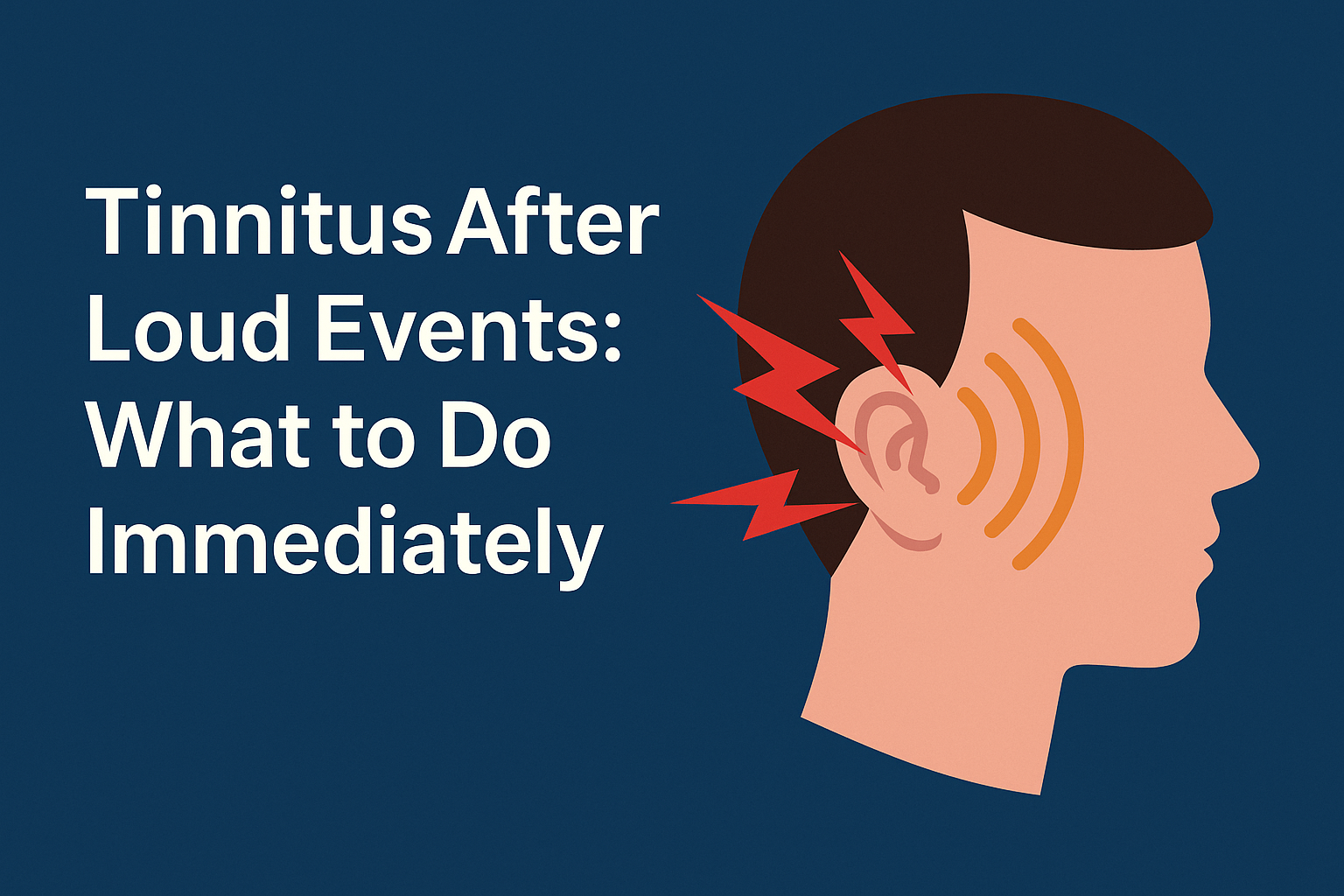If Your Ears Are Ringing Right Now: Do This
- Get to a quiet place—leave the loud environment.
- Give your ears rest—avoid headphones and loud sounds for 24–48 hours (safe listening tips).
- Use gentle sound—fan, white‑noise, or soft ambient audio to reduce the contrast of the ringing.
- Hydrate and sleep—fatigue and dehydration can make tinnitus feel worse.
- Avoid excess caffeine, nicotine, and alcohol for a day or two; these can aggravate tinnitus in some people.
- Watch for red flags—sudden hearing loss, severe ear pain, spinning dizziness, or tinnitus that lasts > 1 week.
Why the Ringing Happens
Loud sound can temporarily overwhelm the tiny sensory hair cells in the cochlea, leading to a temporary threshold shift—your hearing feels dulled, and phantom sound (tinnitus) may appear. Most people recover over hours to days, but repeated noise exposure increases the risk of noise‑induced hearing loss and chronic tinnitus.
As a rule of thumb, risk rises quickly above everyday levels: sustained exposure around ~85 dB (busy traffic) for many hours can be harmful, while short bursts above 100 dB (clubs, stadiums, some concerts, fireworks) can cause damage in minutes.
Immediate Relief Strategies (First 24–48 Hours)
- Quiet & contrast reduction: Absolute silence can make tinnitus feel louder. Use low‑level background sound (fan, rain audio, or a white‑noise app) for comfort, especially at bedtime.
- Volume discipline: If you must listen, keep levels low and follow the 60/60 guideline (≤60% volume, ≤60 minutes), and prefer over‑ear headphones with good isolation. See Safe Listening With Headphones.
- Gentle routine: Hydration, a walk, and consistent sleep can help your nervous system down‑shift.
- Avoid DIY ear “fixes”: Don’t insert anything into the ear canal, and skip unproven remedies (e.g., ear candling).
Real‑World Example
After a basketball game, a patient (name changed) reported loud ringing that faded after two days—but it returned after each home game. We fit high‑fidelity musician earplugs and set a headphone safe‑listening plan. The next month, no lingering ringing and no “muffled” next‑day feeling. Small changes can protect hearing without giving up the sounds you love.
Preventing the Next Episode
- Carry earplugs—foam works well when inserted deeply. For clearer sound at shows, use musician earplugs with flat attenuation (‑9/‑15/‑25 dB filters). Learn more in our musicians’ guide.
- Mind the venue: Stay back from speakers; take “quiet breaks” every 30–60 minutes.
- Headphones smartly: Favor over‑ear models with isolation so you can keep volume lower. See Safe Listening With Headphones.
- Know the numbers: If a setting forces you to shout at arm’s length to be heard, sound levels are likely unsafe.
- Build a plan: Our hub on Noise‑Induced Hearing Loss covers exposure limits and protection options for concerts, work, and daily life.
FAQs
How long should tinnitus last after a loud event?
Many cases fade within 24–48 hours. If it persists beyond a week—or comes with pain, dizziness, or noticeable hearing loss—book an evaluation.
Can one concert cause permanent tinnitus?
Yes. A single very loud exposure can cause lasting damage. The risk increases with higher volume and longer exposure times.
Do headphones make post‑concert tinnitus worse?
They can if the volume is high. If you need background sound for sleep, use low levels and soothing audio. Review safe listening tips.
What earplugs are best for concerts?
High‑fidelity (musician) earplugs reduce volume more evenly across frequencies, preserving music quality. See our guide for musicians.
Should I clean my ears to fix tinnitus?
No home ear cleaning with objects or candles. If you suspect wax, see a professional; unnecessary cleaning can worsen problems.
Bottom Line
Treat post‑event ringing as a warning sign. Step into quiet, use gentle sound for comfort, and give your ears a day or two to recover. Protecting your hearing today means more music, more conversations, and fewer worries tomorrow.
Related reading: Noise‑Induced Hearing Loss: The Complete Guide • Safe Listening With Headphones • Best Hearing Protection for Musicians • How Loud Is Too Loud?

